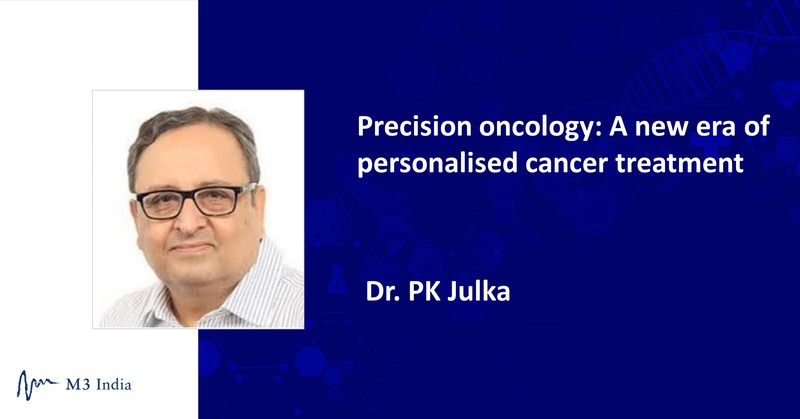'Precision oncology: A new era of personalised cancer treatment'- Dr. PK Julka
M3 India Newsdesk Mar 11, 2020
Dr. PK Julka writes on the new targeted mode of treatment in oncology- precision medicine which looks at the finer characteristics of the disease and fine tunes therapy for improved outcomes.

Global cancer burden is on the rise and it is estimated that by the year 2030 there could be 27 million people with cancer translating to more than 17 million cancer deaths each year. Although, the death rate from cancer had fallen by 27% over the past 25 years, it still remains a leading cause of death worldwide. Cancer happens due to the uncontrolled growth of the cells that are the basic building blocks of the body. Surgery, radiotherapy and chemotherapy have been used alone or in combinations with limited success.
Though cancer has a biological origin the approach for its management has remained either physical in the form of surgery or radiotherapy or chemical in the form of chemotherapeutic agents. Scientific advancements in molecular biology and genetics of cells have triggered the discovery of novel approaches for improved diagnosis as well as management of this disease.
Our body contains trillions of cells and inside every cell there is a control centre which is called the nucleus which has 23 pairs of chromosomes and genes contained in these chromosomes. Each gene is made up of a specific DNA sequence that contains the code to make a protein which in turn performs a specific function in the body. In all, humans have around 25,000 genes. As half of the DNA is inherited from mother and half from the father, there are two copies of every gene.
Faulty genes and cancer
Mutations are abnormal changes in the DNA of a gene that occur when cells divide. These are caused by the natural processes in our cells, and by various other risk factors such as tobacco smoke, radiation exposure, ultraviolet radiation from the sun, diet, chemicals in our environment etc.
Sometimes, people inherit certain faulty genes from their parents which put them on an increased risk of developing cancer. As there are two copies of most of the genes, one from each parent, both the copies requires mutation in order for a gene to stop working completely and potentially leading to cancer.
Usually, gene mutations happen in the cells all the time and the cells or immune system has the ability to detect and repair these mutations. If the mutations cannot be repaired, the immune system sends a message to the cell telling it to die via a process called programmed cell death. But sometimes, a cell does not die and the mutations are not repaired leading to uncontrolled multiplication of cells and development of cancer.
There are four main types of genes namely oncogenes, tumour suppressor genes, DNA repair genes, and self-destruction genes that plays an important role in the development of cancer. Most cancers have faulty copies of more than one of these genes.
Precision Oncology
Next-generation sequencing (NGS)-based genomic profiling of advanced solid tumours has given a new perspective to personalised patient care in oncology. In a single run, NGS interrogates the entire coding sequence of 315 cancer-related genes plus select introns from 28 genes to identify the genomic alterations that can be targeted using either approved therapies in a patient’s tumour type or any other tumour type. Further, tests such as Tumour Mutational Burden (TMB), Microsatellite Instability (MSI) and PD-L1 are biomarkers for immunotherapy and can help identify patients that may respond to Immuno-Oncology (I-O) therapy.
Immunotherapy can be used either alone or in combination with chemotherapy or targeted therapies for better outcomes in cancer patients. The various translational and targeted approaches for cancer management are being explored in the form of monoclonal antibodies, EGFR inhibitors, anti-angiogenesis, proteasome inhibitors, tyrosine kinase inhibitors, farnesyl transferase inhibitors, gene therapy and immunotherapy etc.
CAR T-cell therapy, dendritic cell vaccine and antibody-drug conjugate (ADC) are newer forms of immunotherapy and targeted therapy approaches for treating various cancers.
- While CAR T-cell uses specially altered T cells to fight cancer, dendritic cells help the immune system to recognise cancer cells and start an immune reaction against them
- ADC on the other hand, targets the tumour cells in order to specifically kill them leaving behind the healthy cells
The improved understanding of cancer genetics is helping in predicting the response of newer therapies in certain cancer types. For example,
- Patients with breast cancer with HER2 positive cells respond very well to newer drugs such as Trastuzumab and Lapatinib.
- In non-small cell lung cancer harbouring ALK or ROS1 gene rearrangements treatment with Crizotinib has demonstrated a superior response.
- Cetuximab and Panitumumab does not help advanced colorectal cancer patients having mutations in the KRAS gene.
- Erlotinib works better in non-small cell lung cancer patients whose cancer cells have a certain mutation in the EGFR gene.
Gone are the days when different patients with a common cancer were treated in a similar way. Molecular characterisation of a patient’s tumour to identify the genetic mutation followed by treatment with the appropriate therapy is paving the way for a new era of improved treatment outcomes while offering personalised treatment to individual patients.
Disclaimer- The views and opinions expressed in this article are those of the author's and do not necessarily reflect the official policy or position of M3 India.
The author, Dr. PK Julka is the Senior Director of Oncology at a prominent hospital in Delhi.
-
Exclusive Write-ups & Webinars by KOLs
-
Daily Quiz by specialty
-
Paid Market Research Surveys
-
Case discussions, News & Journals' summaries